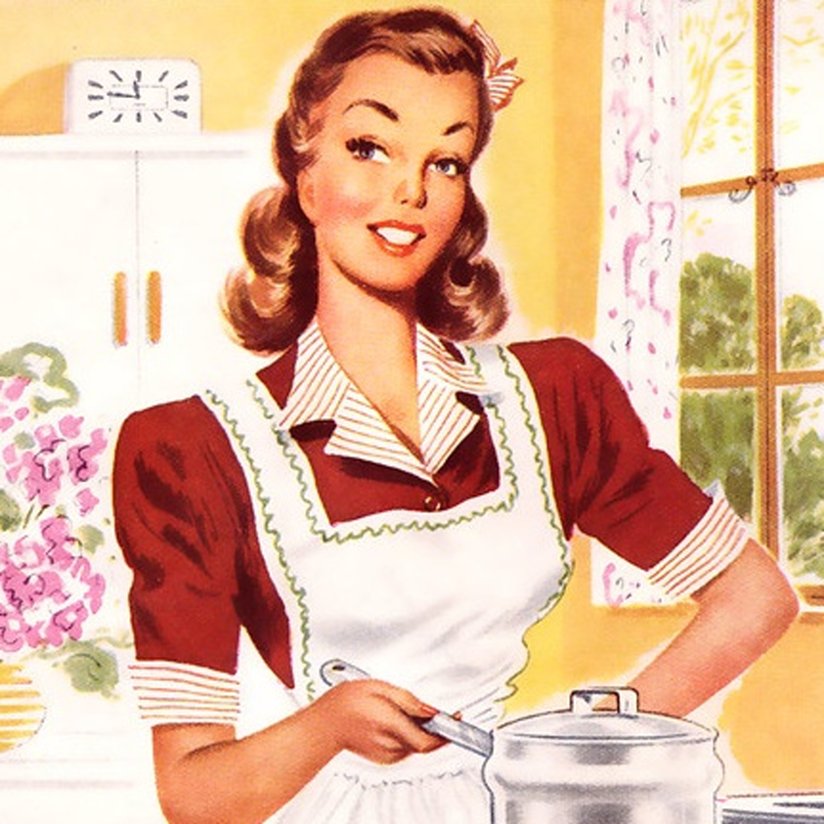A Place for Women in Religion—Hint: It’s Not the Kitchen
Let me just start by saying I’m about as girlie of a girl as anyone I’ve ever known. A dress is my attire of choice, even during many forms of exercise, and I absolutely love makeup. At the age of 10 my mom got me to quit biting my nails by telling me she would buy me any nail polish I wanted, if I would just stop. This came after many other attempts to rid me of my gnawing habit—scoldings, hand-slappings, “sour apple” and “bitter” tasting nail creams, none of which did anything to dissuade me. But one offer to buy me pretty nail polish “for the rest of your life if that’s what it takes!” and I quit nail biting forever.

That being said, my favorite activity was probably working with my hands, right alongside my dad.
We wired electrical outlets, put up sheetrock and assembled furniture (long before we discovered Ikea). We changed the oil in the car and the spark plugs, installed stereos and replaced worn brake pads.
“This is man’s work, go and help your mom in the kitchen.”
It’s not that my dad didn’t have sons. It’s just that my gender wasn’t his test of whether or not I could swing a hammer.
I was interested. I was helpful. I learned the ropes and got to work quickly. End of story.
So since nail polish and socket wrenches were both my reality, I didn’t think much about it.
That was, until I offered to help my stepdad change the oil in his Acura Legend. His reply struck me: “This is man’s work, go and help your mom in the kitchen.”
In frustration I complained to my dad. I was a teenager by then and pretty darn good at handling many basic mechanical and construction activities, if I may say so myself. Dad had come by that day to take me for a ride on his motorcycle.
Standing there in front of both of them, I repeated my stepdad’s words. Without missing a beat my dad looked at him and said, “What kinda tools you got there?”
“Oh this, well this is just a basic oil wrench I picked up at Sears,” my stepdad said with a scoff.
“No, I mean what kinda tools you got that can tell the genitalia of their operator? Seems to me they aren’t tools for working on cars if they can do something like that.”
We left my stepdad standing there, slack-jawed.

A Place for Women
The truth is, both of these adult men in my life had different perspectives, in part shaped by their own circumstances. My dad had been raised in the Midwest by a single mom. He didn’t like what he saw her endure: being treated like a second-class citizen because of her gender. He vowed to treat his own daughters differently.
In the South, however, where I was raised and my stepdad had always lived, women did the cooking, cleaning, cared for the children, and so on. If they worked outside the home, they still did those tasks at home.
At church, women attended the meetings, but they didn’t run them. If it had to do with teaching Sunday school to children, women led, but I had never seen a woman in the ministry.
My first glimpse of a different possibility came when a college religion class had us visit various congregations. I witnessed my first female religious leader—a rabbi at a large Reform synagogue a few miles from my school.
I babysat for many families in the South. More than one woman had confided in me that she felt guilty about working outside the home. More than one man confessed feeling badly that he wasn’t making enough money for his wife to stay home with their children. It seemed that even when household roles were nontraditional, the arrangement was out of necessity and not choice.
Now, I’m not one to say how any household should be run. I think the best relationship is the one that is best for the people in that relationship.
But as for me, I worried that I wouldn’t find my place in such a role.
My first glimpse of a different possibility came when a college religion class had us visit various congregations. I witnessed my first female religious leader—a rabbi at a large Reform synagogue a few miles from my school. I voluntarily attended several more times, even after meeting my course requirements. I spoke with the rabbi, who treated me with warmth and empathy despite the fact that I wasn’t a member of her religion or her congregation.
She showed me a new possibility: that our aptitude for a role might not be based on gender.
Striving for Equality
On December 10, 1948, the United Nations ratified the Universal Declaration of Human Rights. Each year on December 10, people around the world still celebrate Human Rights Day in remembrance of these bold statements of peace, ratified after the world had just experienced war, the Holocaust, and nuclear weapons used on a civilian population.
The second point, Article 2, states, “Everyone is entitled to all the rights and freedoms set forth in this Declaration, without distinction of any kind, such as race, color, sex, language, religion, political or other opinion, national or social origin, property, birth or other status.”
At times quoting Article 2 right alongside religious texts, many prominent religious figures strive for gender equality within their faiths. The Dalai Lama even called himself a feminist, saying, “Isn’t that what you call someone who fights for women’s rights?”
“The truth is that male religious leaders have had—and still have—an option to interpret holy teachings either to exalt or subjugate women. They have, for their own selfish ends, overwhelmingly chosen the latter.”
Former President Jimmy Carter, a self-proclaimed devout Christian, spoke eloquently on the topic at the Parliament of the World’s Religions in 2009: “It is ironic that women are now welcomed into all major professions and other positions of authority, but are branded as inferior and deprived of the equal right to serve God in positions of religious leadership.”
But he really lays it out when he says:
“This view that the Almighty considers women to be inferior to men is not restricted to one religion or tradition. Its influence does not stop at the walls of the church, mosque, synagogue, or temple. Women are prevented from playing a full and equal role in many faiths, creating an environment in which violations against women are justified.

“The truth is that male religious leaders have had—and still have—an option to interpret holy teachings either to exalt or subjugate women. They have, for their own selfish ends, overwhelmingly chosen the latter.”
Like many other “insiders” in various faiths around the world, Jimmy Carter is working from a place of membership and belonging to affect positive change.
Some women, and the men who support their equality, may rather leave than remain part of an organization where so many are denied equal opportunity for service. Staying can be its own act of rebellion, however.
A recent Religion News Service article quoted the work of professor and Catholic scholar Gina Messina of Ursuline College: “Women are looking for opportunities to have their voices heard and be more effective in their religious traditions… The perception seems to be that it is a feminist act only to leave such a religion. We contend that it is also a feminist act to stay.”
There is precedent of such change within religious circles.
Religions around the world have practiced slavery, polygamy, and other subjugating/unequal broadly institutionalized activities. In most parts of the world, such activities have been banned.
In a New York Times op-ed, columnist Nicholas Kristof spoke to the precedent of slavery: “Each of the Abrahamic faiths accepted slavery,” he stated, alluding to Judaism, Christianity and Islam, three prominent world religions all viewing Abraham as a prominent figure and prophet. “Muhammed owned slaves and St. Paul seems to have condoned slavery. Yet the pioneers of the abolitionist movement were Quakers and evangelicals like William Wilberforce. People of faith ultimately worked ferociously to overthrow an oppressive institution that churches had previously condoned.”
That line really struck me: working “ferociously to overthrow an oppressive institution.”
Religion can still play that role—at least for the brave souls who view all humans as truly equal.
Women in Scientology
My personal quest for higher truth led me to Scientology at the age of 27.
I didn’t choose to become a Scientologist specifically because of the role of women, but I was pleased to encounter many women in the ministry of the church.
From small local churches to a trip to the Freewinds (the church’s religious retreat at sea), I have met women in every level of responsibility. Many of the ship’s key officers are women! Do you know how rare that is? I looked it up and only somewhere between 5 and 22 percent of cruise ship officers are women.

The church’s official statement on female ministers can be found on their website: “The Scientology ministry is open to men and women. Because people are spiritual beings, gender of a minister is not an issue in Scientology. Scientology is a meritocracy. There are no ‘glass ceiling’ limitations based on race, gender, ethnicity or similar criteria for individuals who serve as ministers or as executives in the Church’s ecclesiastical management.”
As an adult and mother now, in my own household, we have come to agreements that work for the management of our family. My husband of 12 years treats me as an equal partner, and we divide up tasks and responsibilities based on our schedules, skillsets and other factors.
At times, one of us has “worn a particular hat,” such as when he assumed the role of bill-payer in the family, and it didn’t work out smoothly, so I took it over. Some jobs we do equally and others we divide. When it comes to child-rearing, we practice what we have jokingly come to refer to as “tag-team parenting”—when one of us has the kiddos, the other one can “tap out” of the arena for a breather, as needed. Do I do the cooking? Absolutely! I like my own food, and so does everyone else in our family. Do I build stuff around the house? That’s usually a group project, since we all enjoy working with tools.
The point is, whoever is best qualified for the job does the job.
It works that way in our household, it works that way in our church. Someday, perhaps, it will work that way the world over.










